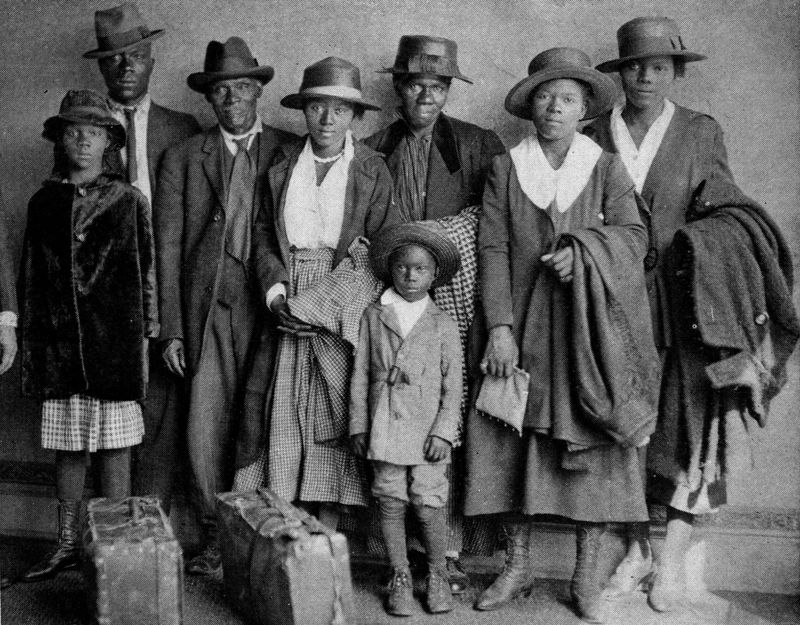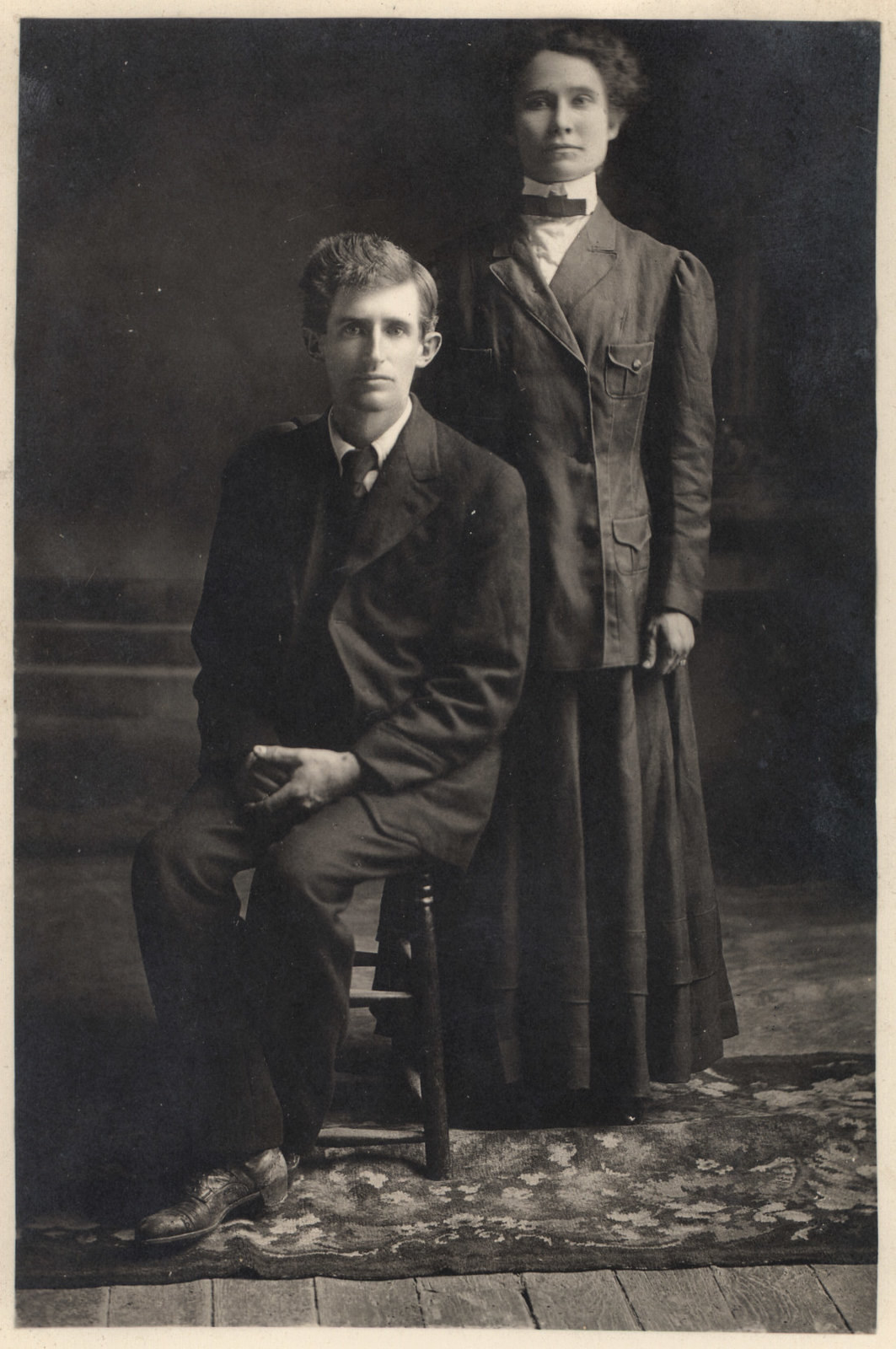
Students will work with conflict and theme as they engage with Maupassant's "The Necklace." Students will start by charting a video to look at how the different types of conflict are present. They then participate in a debate that encompasses the central theme of the story. After the debate, they will... Read more »
Engaging with "The Necklace"
Subject
Course
Grade Level
Standards

Students will activate prior knowledge and make connections to the post-WWII era in America by looking at images from the time period. In addition, students will read poems that depict contrasting points of view from the decade (the point of view of an American versus a Holocaust survivor resettled... Read more »
Characterization
Subject
Grade Level
Standards

This lesson focuses on the reasons for the Great Migration, in which African-Americans left the South during the early 1900s. Students will analyze push and pull factors that led to the Great Migration, observe and summarize a painting series about the Great Migration, and listen to an author discuss... Read more »
The Great Migration
Grade Level
Subject
Course
Standards

This lesson guides students to understand how reading strategies enhance comprehension of a text. Students read a variety of texts, including artwork, a video, and a short story, using the OPTIC strategy. Students use the strategy to make Observations and Predictions about the text to aid their understanding... Read more »
Visual Literacy
Grade Level
Subject
Standards

This grammar lesson will engage students in recognizing, identifying, and creating active or passive voice in their writing. The use of active and passive voice is demonstrated through the short story, "The Monkey's Paw," although any piece of literature could be substituted. This lesson includes optional... Read more »
Grammar/Language Usage
Subject
Course
Grade Level
Standards

This lesson examines key terrorist attacks on U.S. soil and identifies how the Patriot Act was created to prevent terrorism. Read more »
The Patriot Act of 2001
Grade Level
Subject
Course
Standards

Students will use primary sources to explore and help them explain the Boston Massacre. They will compare two images depicting the event and draw conclusions about what happened based on what the artist chose to depict. Students will examine the roles of perspective and propaganda with regard to the... Read more »
Primary sources
Subject
Course
Grade Level
Standards

This lesson engages students in exploring, assessing, and drawing conclusions about the validity of various media sources through exploration of the 2019 "Alienstock" phenomenon. Students will work independently and in groups to compare and analyze different media sources and evaluate the validity and... Read more »
Analyzing Information, Media, and Validity
Subject
Grade Level
Standards

This is an introduction to karyotypes and what uses they have. Prerequisite knowledge would be basic genetic structures, such as chromatids, genes, and alleles. Using this lesson would lead nicely into having a discussion/next lesson about the ethics of gene therapy and CRISPR in humans. Read more »
Karyotype for Chromosomal Disorders
Grade Level
Subject
Course
Standards

Importance of Location in Industry
Grade Level
In this lesson, students examine how location can contribute to the economic success or failure of businesses. Students begin this lesson by watching a brief video about the influence of job outsourcing on the global economy. Next, students will read about the history of a bicycle company and consider... Read more »
Importance of Location in Industry
Grade Level
Subject
Course
Standards

Students will employ a variety of reading strategies to analyze the poem, "The New Colossus." Their analysis will determine the author's perspective. Then, students will use their knowledge of the Statue of Liberty and Ellis Island to write a letter from the perspective of a newly-arrived immigrant.... Read more »
Determining Author's Perspective
Subject
Grade Level
Standards

In this lesson, students will learn about how conflict can often lead to change by examining the ideology of Patrick Henry and Thomas Paine. Students will begin the lesson by considering Patrick Henry’s famous quote, “Give me liberty, or give me death!” Additionally, students will also think critically... Read more »
The Journey to Revolution
Subject
Course
Grade Level
Standards

Students will examine evidence for glacial theory and other competing theories of the early 1800s. Students will read field journal excerpts from geologists as well as analyze the data collected from early Alpine expeditions. Read more »
Glacial Theory
Grade Level
Standards

This lesson uses fiction and nonfiction books to have students think about the author’s purpose for writing the piece. The goal is to help students understand that nonfiction works have common elements with the purpose to inform, while fiction stories have common elements with the purpose to entertain.... Read more »
Author's Purpose: Informing or Entertaining
Grade Level
Subject
Standards

In this lesson, students will be asked to determine what a siren is. Students will read an excerpt from "The Odyssey" and other texts and watch selected videos. They will examine the various texts and videos from different perspectives to draw conclusions about the mythical siren. Read more »
Is It a Bird or Is It a Fish?
Subject
Course
Grade Level
Standards

During this interactive science lesson, students will learn about the patterns of the moon and lunar phases. Over the course of one month, students will observe the moon, look for patterns, and make predictions about the changes in the moon each night. Read more »
Phases of the Moon
Grade Level
Subject
Standards

In this lesson, students will consider the context and evaluate perspectives while comparing "Story of an Hour" and excerpts from "The Awakening". After reading the stories, students will write a short response from the perspective of the characters. Read more »
Perspective
Subject
Grade Level
Standards

Characteristics of Limited and Unlimited Governments
Grade Level
In this lesson, students will learn about and explore characteristics of limited and unlimited governments. After accessing their prior knowledge about governments, students will analyze quotes about governmental power, classify characteristics of governments, and explore historical and contemporary... Read more »
Characteristics of Limited and Unlimited Governments
Grade Level
Subject
Course
Standards

This is the second lesson in a series called, "Survival." In an effort to understand animal characteristics and adaptations, this lesson invites students to make observations about a variety of animals, participate in a modified four corners activity, and create a class Anchor Chart. Learning is extended... Read more »
Animal Adaptations
Grade Level
Subject
Standards

Natural and Man-made Resources: Local and Global
Grade Level
Students will explore natural and man-made resources by using a Card Sort to make observations about resources. Students will develop and create class definitions for the terms in the Card Sort by creating a class T-Chart. After the Card Sort exercise, students listen and interact with a book about... Read more »
Natural and Man-made Resources: Local and Global
Grade Level
Subject
Related
Standards

In this lesson, students will create models to simulate glacial movement. Students then will compare and contrast real glaciers with their models, learn about glacial theory, and research modern-day glaciers to find out what is happening to them. Read more »
Glacial Theory and Earth's Systems
Subject
Grade Level
Standards

Electromagnetic Radiation, Astronomy, and the Inverse Square Law
Grade Level
Students will establish the relationship between radiation intensity and the distance of a radiating source using a simple flashlight model. Students will learn to apply the inverse square relationship to consider the effects of a planet’s distance from the Sun on its ability to be colonized and adapt... Read more »
Electromagnetic Radiation, Astronomy, and the Inverse Square Law
Sponsor
Grade Level
Subject
Course
Standards

In this lesson, students will explore the protected rights all students have on school grounds based on the precedent set by 1969 Supreme Court case Tinker v. Des Moines. Students will analyze how this court case helped to clarify and extend students' First Amendment freedoms. They will then reflect... Read more »
Individual Rights and Freedoms
Grade Level
Subject
Course
Standards

In this second lesson of the "Lord of the Flies" unit, students examine leadership qualities, looking especially at characters Jack and Ralph. Students analyze multiple points of view in the text. Read more »
Leader of the Pack
Subject
Course
Grade Level
Standards

In this sixth lesson of the "Lord of the Flies" unit, students will analyze the text for symbols of power. Students will categorize evidence from the novel to support the claim that either the seashell or the glasses were the ultimate symbol of power. Read more »
I've Got the Power
Subject
Course
Grade Level
Standards

The Philosophies of John Locke and Thomas Hobbes
Grade Level
In this lesson, students analyze the political ideas of Thomas Hobbes and John Locke by brainstorming why people create governments, comparing and contrasting monarchies and democracies and debating as a class which philosopher was right about the amount of power a government should have. Read more »
The Philosophies of John Locke and Thomas Hobbes
Subject
Course
Grade Level
Standards

This lesson is meant to be taught after WWI content and introduces your students to WWII. Students will learn how economic and political issues after WWI lit a fuse that exploded into WWII. Using hands-on activities and discussions, students will explore the vocabulary and multiple causes of WWII. Following... Read more »
Causes of WWII
Subject
Course
Grade Level
Standards

Natural and Man-made Resources: Local and Global
Grade Level
Students will explore natural and man-made resources by using a Card Sort to make observations about resources. Students will develop and create class definitions for the terms in the Card Sort by creating a class T-Chart. After the Card Sort exercise, students listen and interact with a book about... Read more »
Natural and Man-made Resources: Local and Global
Grade Level
Subject
Related
Standards

In this lesson, students will explore the tissues, structures, and functions of the musculoskeletal system, with a specific emphasis on skeletal muscle and bodily motion. They will observe tissues under a microscope and compare tissue structure with the functions of muscle, bone, and connective tissues.... Read more »
Movement and the Musculoskeletal System
Grade Level
Subject
Course
Standards

This labor movement lesson guides students through an exploration of how collective action transforms society, using the United Farm Workers Union and Delano Grape Strike as a compelling historical case study. Students begin by grappling with César Chávez's provocative assertion that "perfect participation"... Read more »
The United Farm Workers Union and the Delano Grape Strike
Related
Grade Level
Subject
Course
Standards

This lesson examines the significance of the Chinese Exclusion Act and how it affected the lives of Asian-Americans within the United States. Read more »
Research Project
Grade Level
Subject
Course
Standards

This lesson provides context for events leading up to World War ll by focusing on the leadership of four dictators: Hitler, Mussolini, Stalin, and Tojo. Students will evaluate how these four leaders contributed to the causes of the war and will later determine what enables leaders to obtain too much... Read more »
Rise of World War II Dictators
Grade Level
Subject
Course
Standards

In this lesson, students will discover the attributes of three systems of government by discussing advantages and disadvantages of each type and then sorting characteristics of each type. Students will reflect on potential issues faced by citizens living under each type of system and will summarize... Read more »
Unitary, Federal, and Confederal Systems of Government
Grade Level
Subject
Course
Standards

In this lesson, students explore reasons for variance in character portrayal. Students begin by watching different interpretations of the same scene and then read an article and each select a monologue to research. Students use a random generator to change the context of their chosen monologues. Finally,... Read more »
Character Portrayal on Stage Versus Film
Grade Level
Subject
Course
Standards

Diamonds, Not Just a Girl's Best Friend
Grade Level
Students will watch an ICAP video of Plains tribe member Crystal Pewo Lightfoot who makes star quilts and start quilt based designs. They will learn the history of the quilts and the Plains tribes, examine quilts using modern principles of design, and make a design of their own. Students will share... Read more »
Diamonds, Not Just a Girl's Best Friend
Grade Level
Subject
Course
Standards

In this lesson, students will explore some culinary aspects of French culture to learn about stereotypes and how learning about other cultures affects our conception of others. Students will define the word “stereotype.” After doing so, they will share stereotypes they have regarding French food, watch... Read more »
Examining Stereotypes in French Cuisine
Grade Level
Course
Standards

This lesson explores a couple of Supreme Court decisions that have specified individual rights of due process under the Constitution. Students will examine the events that led up to the cases of Gideon v. Wainwright and Miranda v. Arizona by analyzing portions of the 5th, 6th, and 14th amendments. They... Read more »
Gideon v. Wainwright & Miranda v. Arizona
Grade Level
Subject
Course
Standards

Students will define “stereotype.” After doing so, they will share stereotypes they have regarding Hispanic food, watch a few videos that will explain or dispel those stereotypes, and come to a consensus on whether stereotypes are useful. When they have finished the discussion, they will construct a... Read more »
Examining Stereotypes in Hispanic Cuisine
Grade Level
Related
Course
Subject
Standards

In this lesson, students reflect on what they already know about how behavior is learned before sharing three things they have learned from observation. Next, students summarize an experiment about observational learning. After learning about other experiments and sorting them according to whether they... Read more »
Observational Learning Theory
Grade Level
Subject
Course
Standards

How do women entrepreneurs overcome barriers to success in the business world? This lesson examines the challenges and triumphs of notable female business leaders. Students will engage in collaborative inquiry, beginning with an iCAP video featuring successful Oklahoma businesswomen. They will identify... Read more »
Women in Business
Related
Grade Level
Course
Standards

Is that really necessary? Often when telling a story or in their writing, students include details that are irrelevant and off topic. In this lesson, students will analyze Sheldon’s ability to stick to relevant information while being a reference for his friend in an FBI interview. Students will then... Read more »
Audience and Purpose
Grade Level
Subject
Standards

Students will analyze the text of Beowulf in order to look objectively at the plot in order to create, in teams or individually, a case to defend a character who has been assigned crimes based on the text. Students will look at context as well as use diction and ethos, pathos, and logos to argue that... Read more »
Diction/Ethos, Logos, and Pathos
Related
Grade Level
Subject
Course
Standards

The Creating 5E Lessons PD focuses on familiarizing participants with the 5E instructional model. The goal of the session is to immerse participants in an authentic 5E activity with an emphasis on each element of the 5E model. Participants will identify and describe the components of a 5E lesson and... Read more »
Target Audience
Intention Or Purpose

Forging a path of strong community in an online classroom can be a challenge. Teachers and students are separated, and maintaining a sense of community relies on some of the same practices we use in the in-person classroom. However, when coupled with uniquely designed virtual materials, authentic teaching... Read more »
Target Audience
Calendar Placement
Group Size
Intention Or Purpose

Participants will experience a workshop session that provides the fundamentals of Essential Questions. They will then discover how they can use Essential Questions as a focus when lesson planning by creating their own content-specific Essential Questions. Read more »
Target Audience
Calendar Placement
Group Size
Intention Or Purpose

In this professional learning session, participants will discuss barriers to traditional professional development and explore how micro-credential courses can help them overcome those barriers. Participants will discuss the pluses and deltas of micro-credentialing, explore a sample course activity,... Read more »
Target Audience
Calendar Placement
Group Size

The Leading Educators in Authentic Development (LEAD) workshop is a series of professional learning sessions that develop teachers’ skills in leading professional development at their school sites. This workshop, which builds on four previous workshops, features two sessions over a one-day period. This... Read more »
Target Audience
Calendar Placement
Group Size
Intention Or Purpose

This professional learning session supports school teams to plan, prepare, and implement the K20 "Power Up: ACT Prep" 10-week curriculum. Participants launch the Power Up curriculum, determine when to administer the pre-ACT, and select who will lead instruction across classrooms. The selected educators... Read more »
Target Audience
Calendar Placement
Group Size
Intention Or Purpose
Related

As artificial intelligence tools become more accessible to students and educators, it’s critical that schools build a shared understanding of how to use these tools responsibly and effectively. In this session, educators will explore the foundational elements of AI literacy, practice crafting high-quality... Read more »
Target Audience
Calendar Placement
Group Size
Intention Or Purpose
Related

When you have a big task ahead of you, you need a plan. Why? Because when you have setbacks, a solid plan and manageable goals can help. In this activity, students learn about using micro-goals to break apart large tasks into smaller pieces, how to make big projects more manageable, and how to handle... Read more »
Calendar Placement
Group Size

